PRINCETON, NJ -- By a better than 2-to-1 margin, Americans are opposed to closing the Guantanamo Bay prison that houses terror suspects and moving some of those prisoners to the United States. Americans express even more widespread opposition to the idea of moving the prisoners to prisons in their own states if Guantanamo is closed.
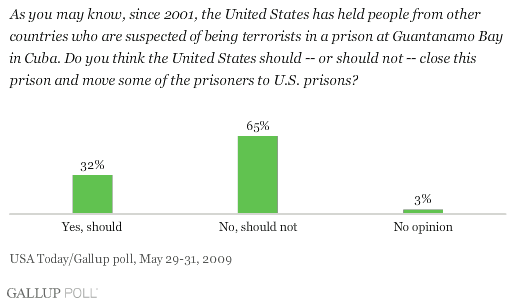
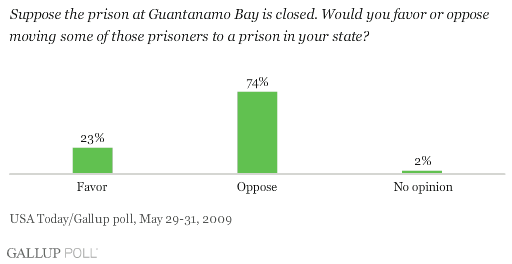
These results are based on a May 29-31 USA Today/Gallup poll. Early in his administration, President Obama announced that he would close the controversial prison within a year. However, his policy received a bit of a rebuke last month when the U.S. Senate rejected funding for the closure until the president outlines a plan for what to do with the terror suspects still being held there. Even some prominent Democratic senators rejected the idea of moving Guantanamo detainees to U.S. prisons.
Americans are especially resistant to closing the prison and transferring the terrorism suspects to prisons in their own states -- only 23% favor this, while 74% are opposed. That represents a nine-point falloff from the 32% who support moving prisoners to the United States (with no specific location mentioned). Thus, even a segment of Americans who in general support closing Guantanamo are opposed to moving its terrorism suspects to prisons in their own "backyard."
The poll indicates that Americans tend to be emotionally invested in the outcome of the policy -- 7 in 10 say they would be "upset" if Obama does not follow their preferred course of action on the issue. However, most of the highly charged sentiment comes from those who oppose closing the prison. Fifty-four percent of Americans not only say they oppose closing Guantanamo and moving prisoners to the United States, but say they would be "upset" if the government does this. By contrast, only 18% of Americans support closing the prison and would be upset if the government does not do so.
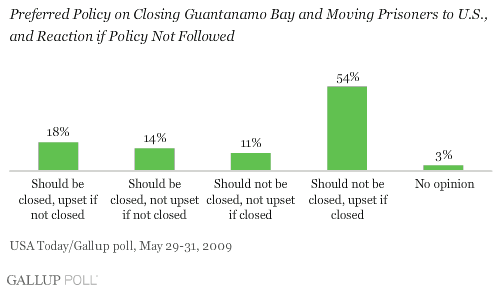
Polling by other firms has found greater support for closing Guantanamo, using different question wordings. Most of these differ from the Gallup question in that they associate the policy with President Obama and do not mention what would be done with the terror suspects who are currently housed at Guantanamo.
For example, a May 28-June 1 AP/GfK poll finds Americans evenly divided, with 47% approving of President Obama's "decision to close the U.S. military prison in Guantanamo Bay within a year," and 47% disapproving.
Most of the other recent polling is structured similarly to the AP wording, and finds similar results. The only other recent poll that addresses the handling of the prisoners is an April 22-26 CBS News/New York Times poll, which found 47% saying the U.S. should "continue to operate the prison" and 44% saying it should "close the prison and transfer the prisoners somewhere else."
That poll was conducted before the Senate vote. Much of the discussion after that vote concerned the possibility that some of the prisoners would be sent to U.S. prisons. Thus, it is possible the poll's results would differ if asked today because it may now be clearer to Americans that transferring prisoners "somewhere else" might include the United States.
Republicans are almost united in opposition to closing Guantanamo and moving some prisoners to U.S. prisons -- 91% are opposed. Independents also show solid opposition. Democrats -- who have typically favored closing the prison in previous Gallup polling -- also do so in the current poll, but by only a slim 53% to 42% margin.
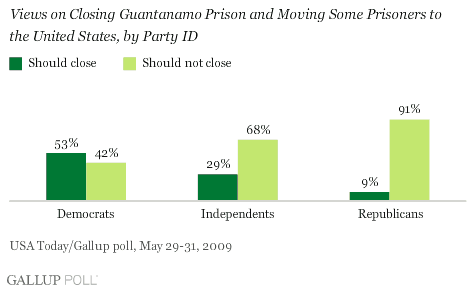
Public Not Buying Obama Argument?
The day after the Senate vote to deny funding for closing Guantanamo, Obama gave a highly publicized address on terrorism. In it, he argued that the United States' policy of maintaining the prison at Guantanamo Bay has weakened U.S. national security because it became an international symbol of U.S. mistreatment of terrorism suspects.
Thus far, Americans don't seem to be persuaded by the Obama argument -- only 18% believe the Guantanamo Bay prison has weakened U.S. national security. More than twice as many take the opposing view that it has strengthened U.S. security. The remainder believe it has not had an effect or have no opinion on the issue.
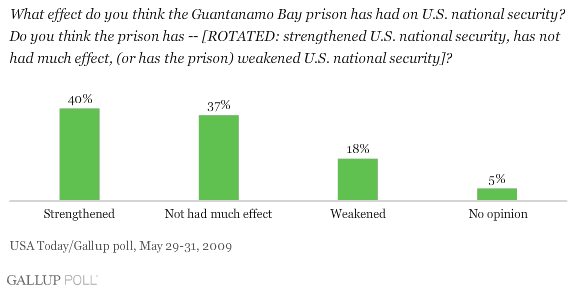
Somewhat surprisingly, only a minority of Democrats, 33%, believe Guantanamo has weakened U.S. national security; Democrats are more inclined to say it has not had an effect. Republicans overwhelmingly believe Guantanamo has strengthened U.S. security.
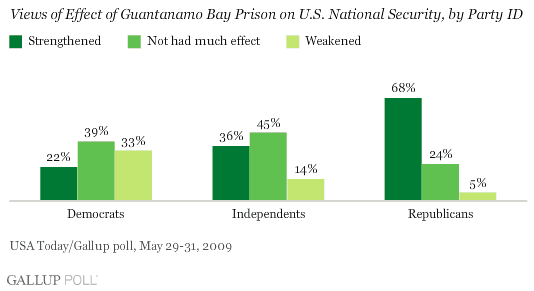
Implications
The Guantanamo Bay prison closure could end up being one of the more difficult policies for the Obama administration to carry out, particularly because Congress has made it clear that it will not fund the closure without details about how it will be done.
The fact that the significant majority of Americans oppose closing Guantanamo when they are told that some of the prisoners would be sent to the U.S. highlights the difficulties Obama will face in deciding what to do with the prisoners whom no other country will take. Obama still has time to sort through the possibilities, as his executive order calling for the closure of Guantanamo includes a 12-month period in which to do so.
Survey Methods
Results are based on telephone interviews with 1,015 national adults, aged 18 and older, conducted May 29-31, 2009. For results based on the total sample of national adults, one can say with 95% confidence that the maximum margin of sampling error is ±3 percentage points.
Interviews are conducted with respondents on land-line telephones (for respondents with a land-line telephone) and cellular phones (for respondents who are cell-phone only).
In addition to sampling error, question wording and practical difficulties in conducting surveys can introduce error or bias into the findings of public opinion polls.
